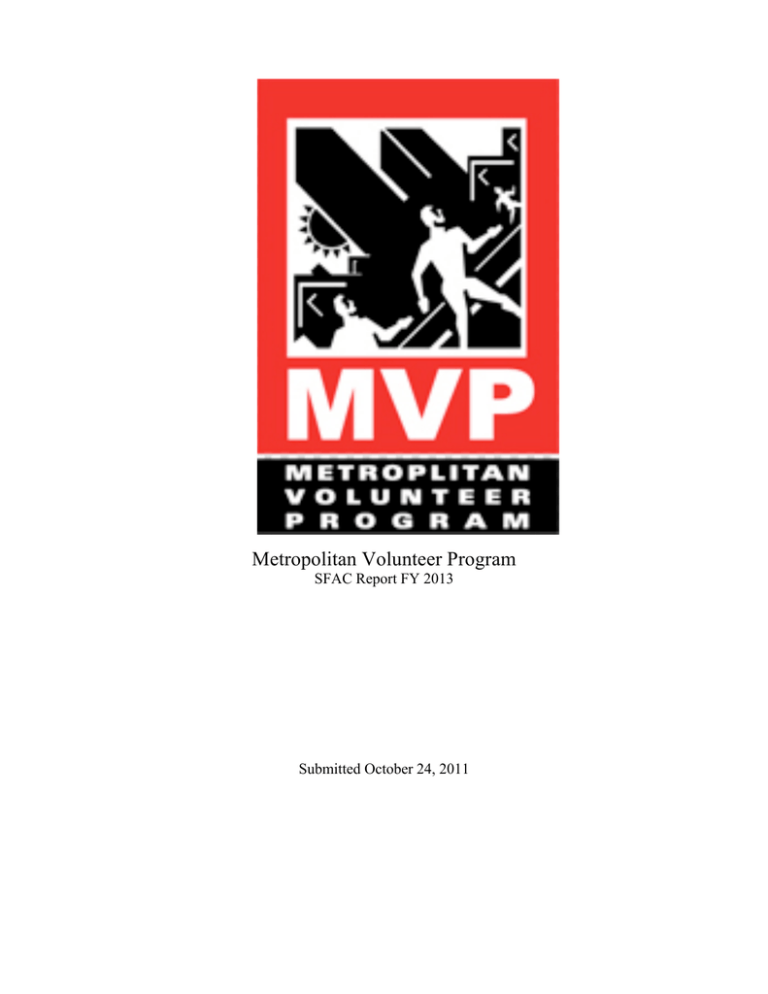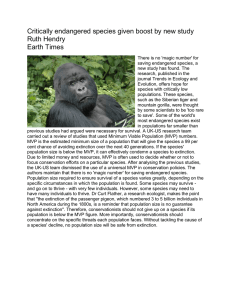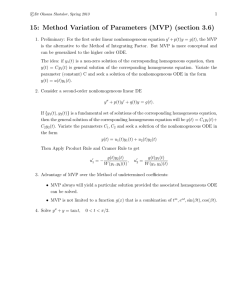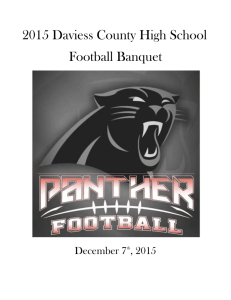Metropolitan Volunteer Program SFAC Report FY 2013 Submitted October 24, 2011
advertisement

Metropolitan Volunteer Program SFAC Report FY 2013 Submitted October 24, 2011 STUDENT FEES ADVISORY COMMITTEE (SFAC) FY2013 PROGRAM QUESTIONNAIRE INSTRUCTIONS: Please respond to all questions. Restate the question before providing your response. An electronic copy of your responses in PDF format, produced according to the PDF Conversion Process Instructions provided with the SFAC Request Packet, should be sent to: SFAC Chair, in care of the Dean of Students Office, at wmunson@uh.edu by 1:00 p.m., Monday, October 24, 2011. It should be noted that only electronic submissions will be considered. 1. Please provide a one-page executive summary of your questionnaire responses. This summary should include, in brief terms: your unit’s mission, how you accomplish your unit’s mission, and a justification of your unit’s student fee allocation in terms of benefits for students. The University of Houston Metropolitan Volunteer Program (MVP) is a student run and funded program that links students, faculty, staff and alumni of UH to the community through volunteerism and outreach. MVP seeks to make the campus aware of activities and opportunities through numerous different means. Our job is to make the University of Houston a more valued member of the community. Our Mission: -Nourishing the spirit of volunteerism -Enhancing educational experiences -Affirming human dignity MVP works to achieve these objectives through education, recruitment, and commitment to service. We accomplish our organizations goals by: -Establishing a solid foundation and incorporate structure within the growing organization. -To create programs that target crucial areas in the Houston community -To provide a strong volunteer base for the Houston community MVP accomplishes these goals by providing specific and efficient programs based on the need of the community. This provides the basis we need for our newfound structure. Our newfound structure provides a Coordinator (32 total) to cater to prominent issues in the Houston area. MVP benefits the University of Houston and its students by: Acting as the official volunteering clearinghouse. We take pride in being a primary source of information about agencies and programs citywide. University of Houston departments, well-known non-profit groups, and any agency in need of volunteers, rely on MVP to raise awareness of their efforts in their specific field and possibly providing them with the necessary volunteers. We provide the volunteer opportunities required by students for their various reasons, whether it is for internships, Greek requirements, or required by the state. We strive to enhance the public image of the University by showing our strong commitment to community service and the betterment of society. 2. Provide an organization chart of your unit. Large units may need to have an overview chart and then more specific charts for each program. Where you have multiple staff in the same position (e.g. counselor, custodian, etc), note this on your chart. Student employees should be cited on the chart and identified as students. ?$&#'B'8"&,-)E'81-&$$#)3#';#,7) !"#$%&'#() *++"+&,-&) !"#$%&'#() ./%$) *++"+&,-&() ?,#@$A-;) 9:,"#() 0'1+&'-)02.23245 6$-"'#)67"8$+) 9:,"#() 9'> 9:,"#) 9'>) 9:,"#) 9'>) 9:,"#) 9'> 9:,"#) 9'>) 9:,"#) 4-#"%:"-;)0'1+&'-5 9'1;,#)9<=6) 9:,"#() 9'>) 9:,"#) 9'> 9:,"#) 9'>) 9:,"#) (9'7B$-+,&$C)6&1C$-&)D$,C$#+) 3. List the objectives that you provided with your 2010-2011 SFAC request. Please comment on your success in achieving these objectives. If an objective changed during the year, please note this and explain. Also, list any new objectives, the rationale for the addition, and comment on your success in achieving these objectives. Nourishing the spirit of Volunteerism: Achieved/On-going MVP strives to evaluate the success of our organization by keeping records of accomplishments and soliciting feedback from program participants. To document service hours, we have publicized our service reports and created a database for entry. We have created databases to track participation in the program. One database that we maintain keeps a record of community agencies that we have worked with in the past. We currently have over 150 agencies and organizations in the database. We believe that if a volunteer can easily and readily view their previous volunteer hours and achievements then it motivates them to reach a personal goal for future self-gratification. We assist volunteer and community service based registered student organizations and provide them with the ability to carry out activities that would be difficult or impossible to achieve without a supporting component such as MVP due to size, experience or lack of support. We continue to host effective events by planning, implementing and benchmarking. “Sandwiches for the Homeless” was an event hosted in April of 2011. We made over 800 peanut butter and jelly sandwiches for the less fortunate within a 2-hour span. The sandwiches were later picked up by Meals on Wheels and taken to the homeless. Enhance educational experiences: Achieved/On-going MVP created a mentoring program for the students at Jack Yates High School. Since Jack Yates freshman class has 43% drop out rate, MVP took the initiative to create a mentoring event to spend a day with freshman and sophomore students. During the event, MVP was able to really connect with the students and explain the importance of graduating High School. Since the event was a complete success, MVP will be making this event annual. MVP worked again with Jack Yates High School on 10/23/10 and is establishing tutoring programs that can be more impactful than one time visits every so often. Statistics show that students who are involved on campus or are active in a student organization are more inclined to get better grades in the classroom. This holds fast; the average GPA for our coordinators is roughly a 3.0, which is remarkably high. Tutoring is not only offered to K-12 students but amongst ourselves we make it a point to “lift as we climb” and tutor each other in our problem areas. Periodically volunteers seek tutoring from their peers and we find ways to provide this in MVP. There is no formal program instituted to these actions, it is more of a “walk-in” type service. Increasing the number of coordinators and focus areas: We believe that MVP has always provided opportunities for the major issues concerning Houston, but to a certain extent. This year we’ve increased the number of Coordinators from 20 to 32 and created a bigger focus in specialized areas. The area’s are as follows: Environmental, Residential Life, Children and Youth, Arts and Culture, Healthcare, Homeless, Special Events, Nutrition and Fitness, Education/Literacy, Family Issues, Social Justice, After-School activities, and Senior Citizens. There is at least one Coordinator over each of these issues and they are actively working to make a better MVP. An example of an increased focus area is an event MVP hosted titled “Care Packages for the Troop”. University of Houston students created care packages for troop in Alaska and also wrote special letters to the troops showing our appreciation for their efforts. MVP has the “man power” to have very focused areas and tend to issues that would otherwise be overlooked. 4. Please discuss the means that you are utilizing to evaluate both your success in achieving the aforementioned objectives and their importance as compared to other objectives that you might pursue. Where data exist, discuss the number of persons served by each of your programs, the satisfaction level of those served, and/or any other assessment measures evaluated. Please provide the method for collecting these data. We first attempt to gauge the number of students that may appear at a volunteering opportunity. We do this by emailing newsletters to students requesting RSVP. We use this same method through social networks, walkins, and by telephone. At the actual event we provide sign-up sheets, mandatory of all volunteers, to keep track of their hours. We have multiple ways of evaluating the success of a program. Verbal interaction during events is a good indicator of what a volunteer thinks of the event. As for events such as Revolution of Heroes (April 5, 2011) for example, we email or hand out evaluation forms to the agencies asking various questions to better the program in the future. Some of these questions may go as such: “How many students participated? Where you satisfied with the turn out? Is there anything we could do better for future references?” Revolution of Heroes was actually our first attempt to request evaluation from agencies. The fair was very impactful; over 300 students and 20 agencies participated. A thank-you email was sent out the agencies that participated. In this email included and evaluation questionnaire that better helped us prepare for this semesters Revolution of Heroes. This evaluation is something we look to do after every opportunity. 5. Please discuss any budget changes experienced since your last (FY2012) SFAC request, their impact on your programs, and your reason for implementing them. SFAC recognizes that some programs did not receive the funds that they requested, that some programs were impacted by additional expenses after the conclusion of the budget cycle, and that some programs may be ahead of or behind their self-generated income projections. In addition, if your unit concluded FY2011 with a Ledger 3 Fund Equity balance, please describe the conditions which caused the fund balance. Overall income and expenditure of MVP SFAC request for FY2011 increased by $6,534 as explained below: A. Income Overall income decreased from the amount on the SFAC request form by a total of $6,534 as follows Decrease in SFAC Allocation Denied ($9,155) Increase in SFAC Request for Tools Increase Request for Student Leader Compensation $ 2,150 $13,549 $ 6,534 B. Expenses Overall expenses increased from the amount on the SFAC request form by a total of $6,534 as follows. Increase in Salary & Benefits Increase in Outdoor Gardening Tools Increase in Administrative Charge The Center Fund Balance Carry forward is $4,424 for FY2011. $3,438 $2,000 $ 1,096 $ 6,534 6. Please list your 2012-2013 objectives in priority order. Larger units may wish to group your response by subprogram. Under each objective, state the specific programs, activities, and/or services that you plan to implement to meet your objectives. Revamping the structure within the organization for a more organized MVP: Creating a base of 5 departments in which all issues will fall under: Cougar C.U.B.S – Targets grade school students to establishing a strong commitment to service in the area of education. Houston H.O.P.E – Educates and raises awareness of health issues around the community. Enriching Houston – Works directly with The City of Houston to better resolve issues prominent in the community. Senior Smiles – Works directly with senior citizens in the community by raising awareness of the health and social issues they face and providing much needed support. Marketing – Creating relationships with Agencies for volunteer opportunities. Creating relationships with Organizations for collaborations. Reaching out to University of Houston students who are seeking volunteer opportunities. Providing more opportunities; less events: Individuals and organizations look to MVP when in need of hours. They also are interested in weekly, bi-weekly, and monthly opportunities such as tutoring. Our goal is to strive to provide more “ready to work” opportunities for each department rather than only hosting events in which if one misses an event one would have to wait a week or two for another to surface. Collaborate with other student organizations/Greeks at the University: We believe through teamwork and collaboration that we can better serve students at the University of Houston. MVP will be extending a helping hand to any organization in need of assistance pertaining to volunteerism. The marketing department would be creating alliances with other student organizations in efforts of producing effective events. Some of the organizations/Greeks that we look forward to working with are Homecoming, Student Program Board, RLH, Athletics, and APO service fraternity. 7. What are the other possible sources of funding available to your unit and what efforts are being made to access them (e.g. grants, donations, etc.)? MVP currently does not have any additional sources of funding available to the organization for operational purposes. MVP is currently planning to apply for independent grants that fund student-run community service organizations. 8. Please describe any overlap between your unit and any other unit(s) providing services to students and the rationale for the overlap. A few on-campus academic departments house volunteer outreach as a part of their focus. While MVP fosters learning, it is not attached to an academic unit or a fraternity. MVP understands that there are other organizations that include volunteerism in their mission, but none solely serve as a clearinghouse for Houston nonprofit agencies and the University of Houston community. It is the desire of MVP to work hand-in-hand with many service organizations and departments to foster the spirit of volunteerism at the University of Houston. In fact, many service-based organizations come to MVP for co-sponsorships and ideas for volunteer opportunities and service projects. Therefore, MVP is and will continue to remain at the forefront of volunteerism at the University. NOTE: The totality of your responses to these questions should give the members of the committee a good, overall understanding of the role and function of your unit(s). To the extent that your responses do not accomplish this, please revise them accordingly. Please send electronic responses ONLY (PDF format) to: 9/2011 Chair, SFAC % Dean of Students Office wmunson@uh.edu




